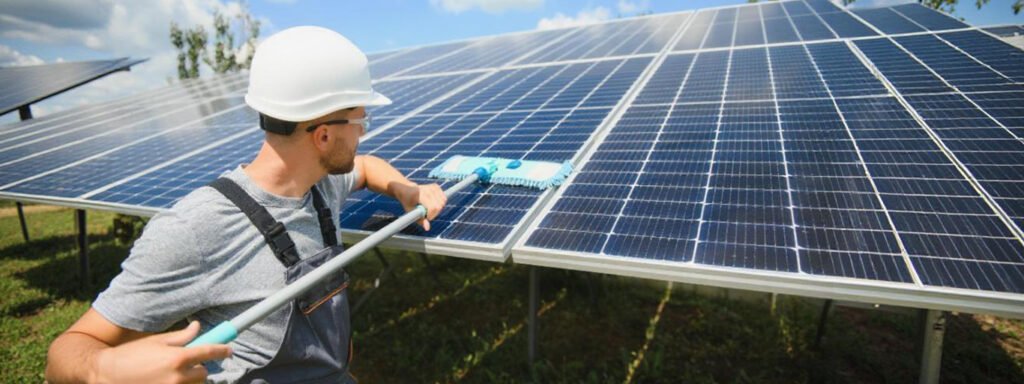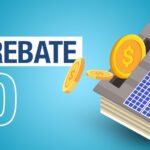Keeping your solar panels clean is essential for maximising their efficiency and longevity. Over time, dirt, dust, bird droppings, and other debris can accumulate on the surface, reducing the amount of sunlight the panels absorb. In Australia, where the climate can lead to heavy dust accumulation, regular cleaning is a crucial part of maintaining optimal solar panel performance. Without proper care, solar panels may underperform, resulting in less energy generation and potentially higher energy bills.
According to a study by the Clean Energy Council, dirty solar panels can lose up to 25% of their energy efficiency. This significant drop highlights the importance of cleaning solar panels regularly to ensure they continue to perform at their best. In this guide, we will cover the most effective cleaning methods, tips for avoiding damage, and common mistakes to steer clear of, helping you keep your solar investment running smoothly.
1. Why Solar Panel Cleaning is Essential for Efficiency
Solar panels are designed to utilise sunlight and convert it into electricity, but dirt and debris can obstruct this process. Regular cleaning ensures that your solar panels continue to operate at maximum efficiency. Here’s why keeping them clean is vital:
- Maximise Energy Production: Dust, dirt, and other particles that settle on your panels can block sunlight, decreasing the amount of energy your panels can generate. In fact, research has shown that even a small layer of dust can cut efficiency by as much as 10%.
- Prolonged Lifespan: Cleaning your solar panels not only boosts efficiency but also extends their lifespan. Regular cleaning prevents debris buildup that could cause long-term damage to the panels, ensuring your investment lasts longer.
- Improved Return on Investment (ROI): Solar panels are a significant financial investment, and ensuring they operate at peak performance allows you to enjoy better returns. A dirty panel might lead to decreased energy production, meaning you won’t get the full benefit of your installation.
By prioritising solar panel cleaning, homeowners can enjoy optimal solar performance year-round.
2. When is the Best Time to Clean Solar Panels?
The timing of your solar panel cleaning plays a significant role in ensuring both efficiency and safety. While cleaning solar panels can be done at various times throughout the year, there are certain periods that are ideal for optimal results.
- Ideal Seasons for Cleaning:
In Australia, the best times to clean your solar panels are during the spring and autumn months. During these seasons, the weather is mild, and there’s typically less intense sunlight compared to the summer. The moderate temperatures reduce the risk of the panels overheating during cleaning and ensure that the cleaning process is more effective.
- Frequency of Cleaning:
The frequency at which you should clean your solar panels depends on the local environment. In dry, dusty areas (such as parts of rural Australia), cleaning may need to be done every 6 to 12 months, while in coastal regions, salt residue may require more frequent cleaning. Generally, you should inspect the panels every few months and clean them when you notice visible dirt buildup.
- Avoid Cleaning on Hot Days:
It’s essential to avoid cleaning your solar panels on particularly hot days or when they’ve just been exposed to the sun for a long period. This is because sudden temperature changes—such as splashing cold water onto hot panels—can cause thermal shock and potentially crack the glass. Instead, clean the panels early in the morning or later in the evening when the sun isn’t too intense.
By choosing the right time and frequency for cleaning, you can ensure the long-term efficiency of your solar panels.
3. How to Clean Solar Panels: Step-by-Step Guide
Proper cleaning of your solar panels involves a few simple steps. However, it’s important to use the correct tools and techniques to avoid causing any damage. Here’s a step-by-step guide to help you clean your panels safely and effectively.
- Step 1: Gather Your Cleaning Tools
Before you start, ensure you have the right tools. For a safe and effective cleaning, you’ll need:
-
- A soft cloth or sponge (avoid abrasive materials to prevent scratches)
- A hose or bucket with water (preferably cool or lukewarm)
- Mild detergent (a non-abrasive cleaner is ideal)
- A squeegee or soft brush with a long handle (optional, for hard-to-reach panels)
Step 2: Turn Off the System
- Always start by turning off your solar system before cleaning. This is a critical safety measure to avoid any electrical hazards while working with your panels.
Step 3: Wet the Surface
- Gently spray the panels with water to loosen any dust, dirt, or debris. Be sure to use a gentle stream, as a strong jet of water could cause damage or force debris deeper into the panel’s surface. If the panels are especially dirty, allow the water to sit for a few minutes to help dissolve the dirt.
Step 4: Clean the Panels
- Use the soft cloth or sponge to wipe down the panels in a circular motion. If the dirt is stubborn, you can apply a mild detergent diluted with water. However, avoid using harsh chemicals or abrasive scrubbers, as they can damage the panel’s surface or coatings. For tougher stains or bird droppings, a soft brush may help.
Step 5: Rinse and Dry
- Once the panels are cleaned, use a hose or bucket of water to rinse off any remaining detergent. If you’re using a squeegee, gently pull it over the panel surface to remove any excess water. It’s best to let the panels air-dry to avoid water streaks.
Step 6: Inspect the Panels
- After cleaning, take a moment to inspect the panels for any visible signs of damage or wear. If you notice any cracks, corrosion, or issues, consider having a professional solar technician perform a more thorough inspection.
4. Common Mistakes to Avoid When Cleaning Solar Panels
While cleaning your solar panels is important, there are several common mistakes that can potentially damage the panels or decrease their efficiency. It’s crucial to avoid these errors to ensure your panels stay in optimal condition.
- Using Harsh Cleaning Products:
One of the biggest mistakes homeowners make when cleaning their solar panels is using harsh chemicals or abrasive cleaners. These substances can damage the protective coating on the panels, leading to corrosion and reduced efficiency. Stick to a mild detergent and avoid any products that could scratch or degrade the surface.
- Cleaning During Hot Weather:
As mentioned earlier, cleaning solar panels in the middle of a hot day can cause thermal shock due to the rapid temperature change from the hot sun to cold water. This can crack the panels or cause other long-term damage. Always clean in the cooler parts of the day—early morning or evening—when the panels are not exposed to direct sunlight.
- Using High-Pressure Water:
Another common mistake is using high-pressure water to rinse off the panels. A pressure washer can force water into the seams of the panels or cause debris to scratch the surface. It’s important to use a gentle flow of water instead of a high-pressure jet to prevent any unnecessary damage.
- Climbing onto the Roof Without Proper Safety Measures:
Safety should always be a priority when cleaning solar panels, especially if they are on the roof. Never attempt to climb onto your roof without the proper equipment or assistance. Falls and accidents are more common than you think, and it’s better to hire a professional for rooftop cleaning if you’re unsure of how to do it safely.
- Neglecting Regular Maintenance:
Cleaning your solar panels is only one part of maintaining their efficiency. Regular inspections, checking the wiring, and ensuring no debris is obstructing the panels are also essential. Neglecting these tasks can result in decreased performance and could even void warranties.
5. When to Call a Professional for Solar Panel Cleaning
While many homeowners can clean their solar panels themselves, there are situations where it’s best to call in a professional. Here are some scenarios where hiring an expert is the right choice.
- Difficulty Reaching the Panels:
If your solar panels are located on a high or steep roof, it can be dangerous to clean them yourself. Professionals have the proper tools, ladders, and safety equipment to access hard-to-reach panels safely. If you’re unsure about your ability to clean the panels without risking injury, it’s always better to hire an experienced technician.
- Persistent Stains or Heavy Dirt Build-Up:
Sometimes, dirt and debris can accumulate so much that home cleaning methods won’t be effective. For example, bird droppings, tree sap, or stubborn mineral deposits can be difficult to remove. In these cases, professional cleaners have specialised tools and techniques to tackle tough stains without damaging the panels.
- Panel Damage or Malfunction:
If you notice any visible damage to your solar panels, such as cracks, chips, or visible wiring issues, it’s best to contact a professional for an inspection. Attempting to clean damaged panels yourself may cause further harm. A technician will assess whether any repairs are needed and can perform them safely.
- Large-Scale Installations:
For homes with multiple solar panels or larger systems, it might be more efficient and safer to have a professional take care of the cleaning. A professional service can quickly and efficiently clean multiple panels, ensuring no damage is done in the process.
- Lack of Time or Expertise:
If you simply don’t have the time, inclination, or confidence to clean your panels, hiring a professional can save you the hassle. Professional cleaners are trained to handle all aspects of solar panel maintenance, from cleaning to inspection, and can ensure the job is done correctly.
Conclusion
Regular cleaning and maintenance of your solar panels are essential for maximising their performance and longevity. By following the steps outlined in this guide, avoiding common mistakes, and knowing when to call in a professional, you can keep your solar panels running smoothly and efficiently, ensuring that your solar investment continues to pay off.



